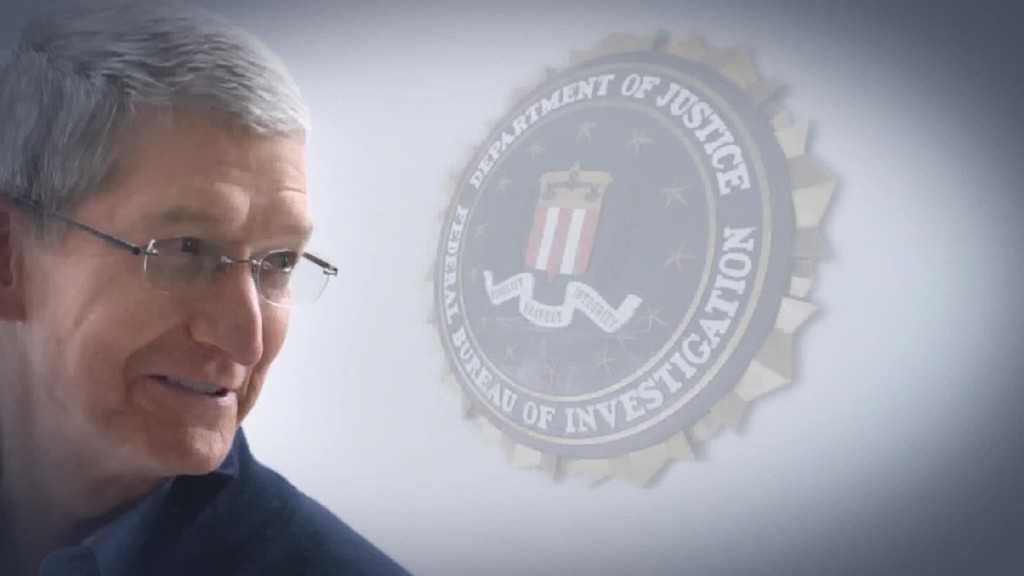
The Department of Justice says the FBI has accessed the iPhone used by one of the gunmen in the San Bernardino terrorist shooting.
Law enforcement officials were able to break into the phone used by Syed Farook with the help of an unnamed third party. Government officials did not go into detail about what was found on the phone.
"The FBI has now successfully retrieved the data stored on the San Bernardino terrorist's iPhone and therefore no longer requires the assistance from Apple required by this Court Order," DOJ spokeswoman Melanie Newman said in a statement.
The DOJ is dropping the case against Apple, since it no longer needs the company's help.
Farook was one of two shooters in the December 2015 attack that left 14 people dead, and the government has been trying to force Apple to help bypass the phone's security features.
Apple (AAPL) has declined to help, saying it would compromise the security of all iPhone users. The company has argued that law enforcement officials don't understand the consequences of creating a backdoor.
The two sides were due in court last week, but the judge granted a last minute request from the DOJ to postpone the hearing, saying an unidentified party came to the FBI with an alternative method for hacking into the phone.
The fact that the DOJ was able to successfully access the phone without Apple's help is bad news for the tech giant because it suggests Apple's encryption technology is not as advanced as once thought.
Related: FBI investigating outage at Maryland hospital chain
In a statement, Apple said the case "should have never been brought." It reiterated its objection to the FBI's demand that the company build a backdoor into the iPhone, a step it said would have "set a dangerous precedent."
However, Apple said it plans to continue to help police with other criminal investigations. For instance, the company currently provides police who have warrants access to customer iCloud accounts.
"Apple believes deeply that people in the United States and around the world deserve data protection, security and privacy," Apple said. "Sacrificing one for the other only puts people and countries at greater risk."
The company said it remains committed to participating in the broader discussion of civil liberties and collective security.
Apple did not address the hack specifically in its statement Monday. However, previously the company said this vulnerability was consistent with its fear all along -- that it was in an "arms race" with people looking to exploit bugs in its software.
A law enforcement official, speaking to reporters on condition of anonymity, would not reveal how it pulled off this hack. He said it was "premature" to say whether this method works on other devices -- he could only confirm that it worked on this particular phone, an iPhone 5C running a version of iOS 9 software.
He would not name the "third party" that helped the FBI. And he refused to say whether the FBI will disclose this hacking method to Apple so the company can protect future phones from being hacked this way.
Normally, in a situation like this, the FBI must hold a high-level meeting with the president's National Security Council to discuss whether to tip off Apple about the hacking method, according to a senior Obama administration official. Hacks are only possible through vulnerabilities in technology, and the same method used by the FBI could be used by foreign governments to hack Americans' iPhones.
The FBI should have that discussion immediately, said Ross Schulman, senior policy counsel at the Open Technology Institute, a think tank.
"The bug is, so far as we know, widely distributed and can give complete access to a device that so many of us rely on daily. Those are great reasons to tell Apple so they can fix the problem," he said.
Several experts closely watching this case say the fight between the FBI and Apple will only continue elsewhere. Both sides are already waging a similar battle over a criminal's iPhone in New York City.
"This case was never about just one phone," said Alex Abdo, an attorney with the American Civil Liberties Union. "Unfortunately, today's news appears to be just a delay of an inevitable fight over whether the FBI can force Apple to undermine the security of its own products."
Editors Note: An earlier version of this story contained a correction that misstated the nature of the FBI's hack. The article has been to updated to reflect what the government said regarding the hack.

